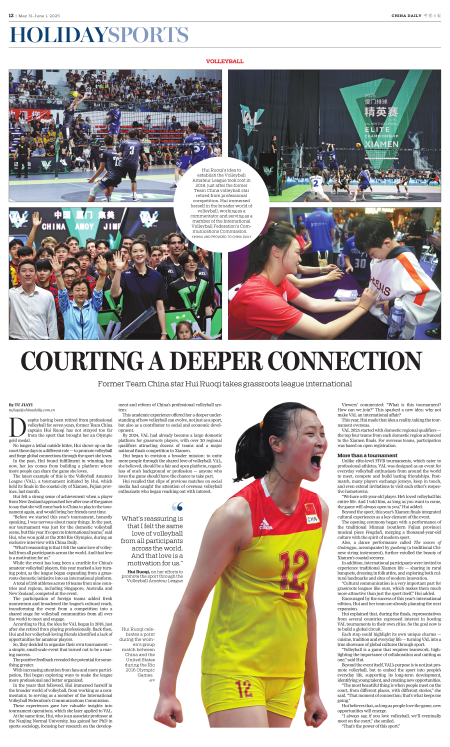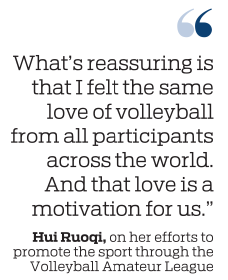
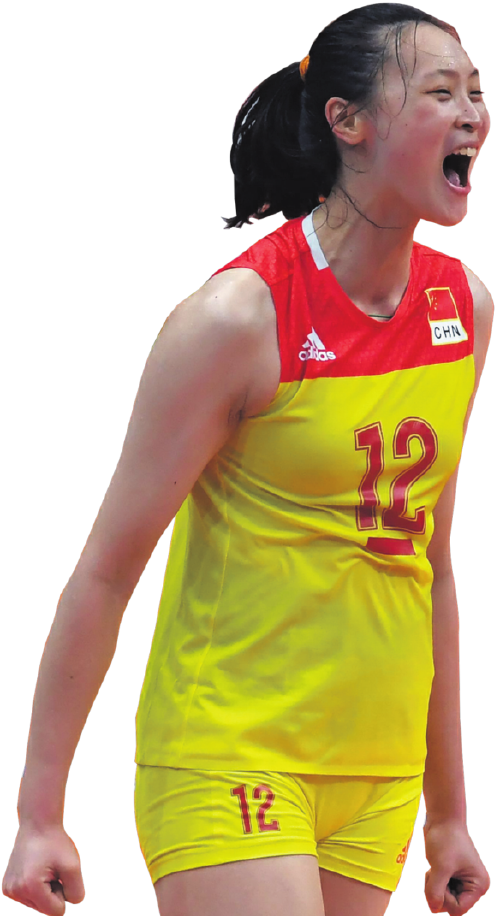
Hui Ruoqi celebrates a point during the women's group match between China and the United States during the Rio 2016 Olympic Games.
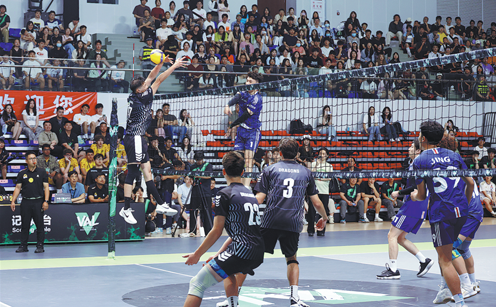
Hui Ruoqi's idea to establish the Volleyball Amateur League took root in 2018, just after the former Team China volleyball star retired from professional competition. Hui immersed herself in the broader world of volleyball, working as a commentator and serving as a member of the International Volleyball Federation's Communications Commission.
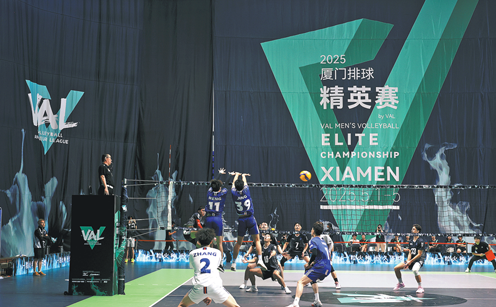
Hui Ruoqi's idea to establish the Volleyball Amateur League took root in 2018, just after the former Team China volleyball star retired from professional competition. Hui immersed herself in the broader world of volleyball, working as a commentator and serving as a member of the International Volleyball Federation's Communications Commission.
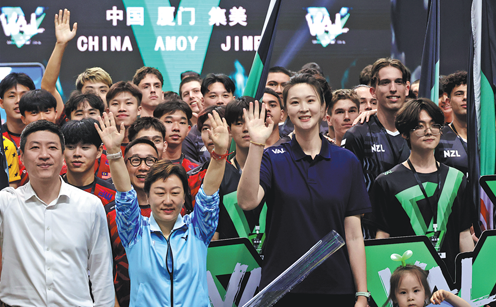
Hui Ruoqi's idea to establish the Volleyball Amateur League took root in 2018, just after the former Team China volleyball star retired from professional competition. Hui immersed herself in the broader world of volleyball, working as a commentator and serving as a member of the International Volleyball Federation's Communications Commission.
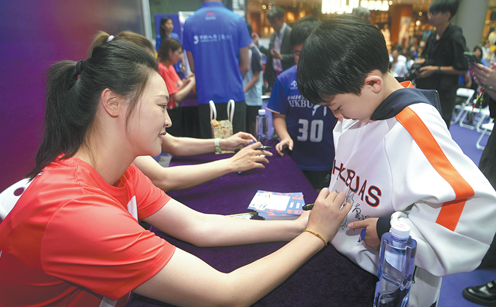
Hui Ruoqi's idea to establish the Volleyball Amateur League took root in 2018, just after the former Team China volleyball star retired from professional competition. Hui immersed herself in the broader world of volleyball, working as a commentator and serving as a member of the International Volleyball Federation's Communications Commission.
Despite having been retired from professional volleyball for seven years, former Team China captain Hui Ruoqi has not strayed too far from the sport that brought her an Olympic gold medal.
No longer a lethal outside hitter, Hui shows up on the court these days in a different role — to promote volleyball and forge global connections through the sport she loves.
In the past, Hui found fulfillment in winning, but now, her joy comes from building a platform where more people can share the game she loves.
The latest example of this is the Volleyball Amateur League (VAL), a tournament initiated by Hui, which held its finals in the coastal city of Xiamen, Fujian province, last month.
Hui felt a strong sense of achievement when a player from New Zealand approached her after one of the games to say that she will come back to China to play in the tournament again, and would bring her friends next time.
"Before we started this year's tournament, honestly speaking, I was nervous about many things. In the past, our tournament was just for the domestic volleyball scene, but this year it's open to international teams," said Hui, who won gold at the 2016 Rio Olympics, during an exclusive interview with China Daily.
"What's reassuring is that I felt the same love of volleyball from all participants across the world. And that love is a motivation for us."
While the event has long been a crucible for China's amateur volleyball players, this year marked a key turning point, as the league began expanding from a grassroots domestic initiative into an international platform.
A total of 350 athletes across 16 teams from nine countries and regions, including Singapore, Australia and New Zealand, competed at the event.
The participation of foreign teams added fresh momentum and broadened the league's cultural reach, transforming the event from a competition into a shared stage for volleyball communities from all over the world to meet and engage.
According to Hui, the idea for VAL began in 2018, just after she retired from playing professionally. Back then, Hui and her volleyball-loving friends identified a lack of opportunities for amateur players.
So, they decided to organize their own tournament — a simple, small-scale event that turned out to be a roaring success.
The positive feedback revealed the potential for something greater.
With increasing attention from fans and more participation, Hui began exploring ways to make the league more professional and better organized.
In the years that followed, Hui immersed herself in the broader world of volleyball, from working as a commentator, to serving as a member of the International Volleyball Federation's Communications Commission.
These experiences gave her valuable insights into tournament operations, which she later applied to VAL.
At the same time, Hui, who is an associate professor at the Nanjing Normal University, has gained her PhD in sports sociology, focusing her research on the development and reform of China's professional volleyball system.
This academic experience offered her a deeper understanding of how volleyball can evolve, not just as a sport, but also as a contributor to social and economic development.
By 2024, VAL had already become a large domestic platform for grassroots players, with over 20 regional qualifiers attracting dozens of teams and a major national finals competition in Xiamen.
Hui began to envision a broader mission: to unite more people through the shared love of volleyball. VAL, she believed, should be a fair and open platform, regardless of one's background or profession — anyone who loves the game should have the chance to take part.
Hui recalled that clips of previous matches on social media had caught the attention of overseas volleyball enthusiasts who began reaching out with interest.
Viewers' commented: "What is this tournament? How can we join?" This sparked a new idea: why not make VAL an international affair?
This year, Hui made that idea a reality, taking the tournament overseas.
VAL 2025 started with domestic regional qualifiers — the top four teams from each domestic region advanced to the Xiamen finals. For overseas teams, participation was based on open registration.
More than a tournament
Unlike elite-level FIVB tournaments, which cater to professional athletes, VAL was designed as an event for everyday volleyball enthusiasts from around the world to meet, compete and build lasting friendships. Postmatch, many players exchange jerseys, keep in touch, and even extend invitations to visit each other's respective hometowns.
"We have a 65-year-old player. He's loved volleyball his entire life. And I told him, as long as you want to come, the game will always open to you," Hui added.
Beyond the sport, this year's Xiamen finals integrated cultural experiences as a key element of the event.
The opening ceremony began with a performance of the traditional Minnan (southern Fujian province) musical piece Fengdali, merging a thousand-year-old culture with the spirit of modern sport.
Also, a dance performance called The waves of Gulangyu, accompanied by guzheng (a traditional Chinese string instrument), further extolled the beauty of Xiamen's coastal scenery.
In addition, international participants were invited to experience traditional Xiamen life — sharing in rural banquets, dressing in folk attire, and exploring both cultural landmarks and sites of modern innovation.
"Cultural communication is a very important part for grassroots leagues like ours, which makes them much more attractive than just the sport itself," Hui added.
Encouraged by the success of this year's international edition, Hui and her team are already planning the next expansion.
Hui explained that, during the finals, representatives from several countries expressed interest in hosting VAL tournaments in their own cities. So the goal now is to build a global circuit.
Each stop could highlight its own unique charms — cuisine, tradition and everyday life — turning VAL into a true showcase of global cultures through sport.
"Volleyball is a game that requires teamwork, highlighting the importance of collaboration and uniting as one," said Hui.
Beyond the event itself, VAL's purpose is to not just promote volleyball, but to embed the sport into people's everyday life, supporting its long-term development, identifying young talent, and creating new opportunities.
"The most beautiful thing is when people meet on the court, from different places, with different stories," she said. "That moment of connection; that's what keeps me going."
Hui believes that, as long as people love the game, new opportunities will emerge.
"I always say, if you love volleyball, we'll eventually meet on the court," she smiled.
"That's the power of this sport."
tujiayi@chinadaily.com.cn
